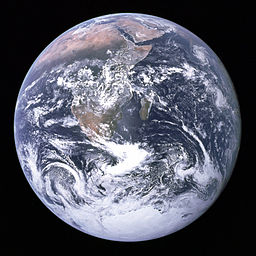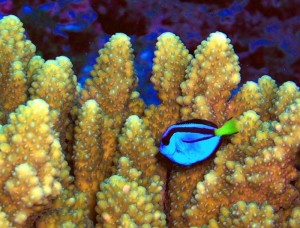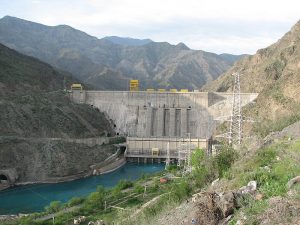Rio+20: Why ‘sustainability’ must include ecology
 One of the reasons we publish more accessible magazine-like articles in the front section of PLoS Biology is to raise awareness about issues that are important both to practicing scientists and to the wider public. As an open access journal, we can reach communities and organisations that don’t have access to the pay-walled literature, and they in turn can redistribute and reuse these articles without permission from us or the authors. The articles we published yesterday in our front section provide a case in point. In Rio de Janeiro this week, world leaders meet for the Rio+20 UN Conference on Sustainable Development to ”shape how we can reduce poverty, advance social equity and ensure environmental protection”. We’re featuring three articles and an accompanying podcast from leading ecologists and conservation scientists that raise absolutely fundamental concerns about the physical limits on resource use that should be considered at the conference—but almost certainly won’t be, because sustainability has focused primarily on the social and economic sciences and developed largely independently of the key ecological principles that govern life.
One of the reasons we publish more accessible magazine-like articles in the front section of PLoS Biology is to raise awareness about issues that are important both to practicing scientists and to the wider public. As an open access journal, we can reach communities and organisations that don’t have access to the pay-walled literature, and they in turn can redistribute and reuse these articles without permission from us or the authors. The articles we published yesterday in our front section provide a case in point. In Rio de Janeiro this week, world leaders meet for the Rio+20 UN Conference on Sustainable Development to ”shape how we can reduce poverty, advance social equity and ensure environmental protection”. We’re featuring three articles and an accompanying podcast from leading ecologists and conservation scientists that raise absolutely fundamental concerns about the physical limits on resource use that should be considered at the conference—but almost certainly won’t be, because sustainability has focused primarily on the social and economic sciences and developed largely independently of the key ecological principles that govern life.

The inspiration for this article collection came from Georgina Mace, one of our Editorial Board members and Professor of Conservation Science and Director of the NERC Centre for Population Biology. It started with an essay submitted by Robbie Burger, Jim Brown, Craig Allen and others from Jim Brown’s lab, in which they argue that the field of sustainability science does not sufficiently take account of human ecology and in particular the larger view offered by human macroecology, which aims to understand what governs and limits human distribution. The very strong – and seemingly obvious – point they make is that ultimately we are constrained by the same hard biophyisical laws that regulate every other species and population on the planet — and we have already surpassed the Earth’s capacity to sustain even current levels of human population and socioeconomic activity, let alone future trajectories of growth. And while we often applaud ourselves for doing something apparently sustainable at a local level, we ignore the fact that we displace the consequences of using up resources either temporally or spatially at larger regional or global scales. These authors provide a powerful set of examples that show the wider detrimental impacts of locally ‘sustainable’ systems, including that of Portland, Oregon – which ‘is hailed by the media as “the most sustainable city in America”’, and the Bristol Bay Salmon Fishery, also cited as a success story. (Burger et al’s point here echoes a call for more ecosystem-based management of fisheries made recently in another recent PLoS Biology article by Levi et al).
During the editorial process, it became clear that while there was agreement that human ecology is a key factor for understanding sustainable resource use , not everyone agreed with the pessimistic and seemingly static outlook presented by Burger et al. We therefore commissioned John Matthews and Fred Boltz from Conservation International to provide their more optimistic perspective. They argue that the world is a much more dynamic place than that set out by Burger et al and that human ingenuity and adaptability (both human and planetary) may provide creative solutions that will allow human societies to overcome resource limitation and continue to grow.
In her editorial and the accompanying podcast, where she’s interviewed by PLoS Biology‘s Liza Gross, Georgina puts the whole discussion into a much wider context. As she explains, one problem is that sustainability and the emerging concept of the green economy means different things to different people, and we don’t yet understand how to intervene with the kind of ‘sustainable’ actions that will make a difference at a local or national scale. Her key point, however, is that it doesn’t really matter whether you think humans can create the sort of ingenious technology to help us ameliorate the problem of ever dwindling resources – what is essential is that the science governing such processes is understood and discussed. This includes incorporating not just an understanding of environmental science, such as macroecology or the impact of climate change and biodiversity loss on resource availability. She argues that more connections need to be made between the natural scientists exploring these issues and the social scientists currently dominating the discussions on sustainability. As she notes in her editorial, it is “a complex nexus of issues where ecological and evolutionary sciences, natural resource management, poverty alleviation, equitable and sustainable growth, individual rights and responsibilities, and the governance of the environment all converge.”

I would like to think that Matthews and Boltz can be proved right and we can somehow engineer ourselves out of the ever deepening hole we’re digging for ourselves. But until we begin to face the facts that global resources are not infinite and that the sustained economic growth currently enjoyed by developed countries might not be possible in the future, I remain an ecological pessimist. As Georgina concludes in her editorial and towards the end of her podcast interview, it is unlikely that these issues will be discussed at this week’s summit. And drawing on a quote from venerated ecologist John Lawton, she cautions that the cost of incorporating environmental science is negligible compared with the cost of ignorance, and the potentially profound consequences for future generations.
(In addition to our collection, there have been a range of other thought provoking articles published this past week on the issues that will be under discussion in Rio. One from Nature, for example, which has been made freely available by its lead author, Anthony Barnosky, emphasises the devastating impact of humans and how the planet is rapidly approaching a critical tipping point. Jim Brown is also a coauthor of this paper.)


[…] Why ‘sustainability’ must include ecology” (blogs.plos.org) — Last year at Rio+20 conference there was a call to involve ecology more when it comes to […]